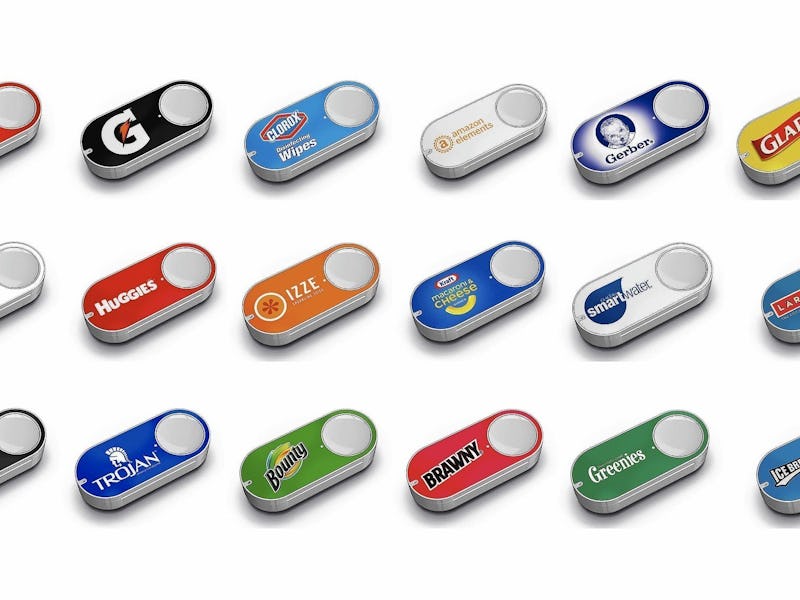An Amazon Dash Button for Weed? It Sounds Ridiculous, But Check Back in a Decade
Pot is fast-tracked for legalization across the country, but California's start ups will determine whether we see "smart" delivery.

Anyone who smoked pot before smartphones will tell you that having Popeye’s delivered in under an hour once seemed like a beautiful dream. Today, it’s a matter of pressing a pre-programmed Amazon Dash Button. One could argue about the increased concentration of retail profits, but one cannot argue about the convenience of pointer finger-based munchies acquisition. The only real question is whether Amazon will ever do one better and facilitate push-button weed delivery. It might sound too good to be true, but that doesn’t mean it’s impossible.
The era of the smart order has arrived at the same time as the era of marijuana legalization, so it make sense that the burgeoning green industry would head in the Insta-blunt direction. There’s also this: Regular weed smokers typically know what they like to smoke and how much, so a one-button preference order id doable. Plus, smokers are already conditioned to pay hefty delivery fees. It makes sense to hook them on a service before they get used to picking up kush on grocery runs.
Unfortunately, the hurdle to smart pot delivery has never been about demand or technology, but rather the complicated set of laws for cannabis legalization. Even if all 50 states legalized weed tomorrow, there would be no way to scale a smart delivery system nationally while marijuana possession remains a federal crime. As it stands, any multi-state transaction involving pot is automatically a federal crime, subject to pretty serious fines and jail time.
For instance, recreational pot is perfectly legal in both Washington and Oregon. However, crossing the I-5 bridge from Vancouver, Washington, into Portland with a half-bowlful of the sticky green is theoretically punishable with up to five years and a $250,000 fine if that cannabis was part of an interstate sale. And, even if the federal government decided to legalize — or more probably decided to officially stop prosecuting marijuana crimes — the laws in states where pot has become legalized are so different, it would make running any sort of multi-state smart marijuana distribution kinda dumb.
To give a sense of why delivery is so tough, take a look at legislation in Washington, where there is absolutely no language for the delivery of recreational marijuana in the laws that legalized recreational marijuana. This means that even though selling is legal, delivery is still technically illegal. However, the state did pass laws stating that medical marijuana delivery is strictly illegal, which actually put one of the Nation’s first weed delivery startups out of business before it really got started.
Meanwhile, just down the I-5 in Oregon, delivery of recreational pot is 100 percent legal, but only if the deliverer carries less than $100 of weed at retail value. Given the prices in the state, that means that at any given time, a delivery driver can’t carry any more than a half ounce at any time. In a city the size of Portland, that pretty much automatically takes high-volume third party delivery services out of the equation. To make this cost effective for the dispensaries, they’d either need to charge an absolute arm and leg for delivery, or have a fairly limited delivery radius to make any smart delivery system feasible.
The good news is that while the complexity of the laws make for an intimidating hurdle, smart recreational weed delivery systems have a very real probability of becoming a thing – but it depends on the success of medical weed delivery startups in California. Billed as “Uber for Weed,” companies like Eaze and Meadow have raised serious investment dollars to provide online ordering and delivery for medical marijuana across the Nation’s third-largest state. These services not only make ordering pot online easy by tailoring selections and ensuring quick delivery, they also provide ways for new customers to get medical ID cards through smartphone apps.
One of the problems with weed legalization in general is that states that have literally been writing the laws on the fly. If California companies can prove successful not only in terms of profit, but the reliability of the technology and compliance with existing state laws – especially once California legalizes recreational pot, likely this November) – they not only provide a path for dispensaries and delivery services. More importantly, successful smart delivery systems in the Golden State will likely help provide a stable and consistent template states across the nation can use to legislate cannabis delivery.
Again, an Amazon-scale interstate ordering is not something we are likely to see in the next decade. However, given more coherent legislation, localized systems could work. And the success of one could provide a model for others — even a model for new laws in states where legalization hasn’t taken hold. For now, we’ll have to settle for dash buttoned foodstuffs, but we can keep dreaming.